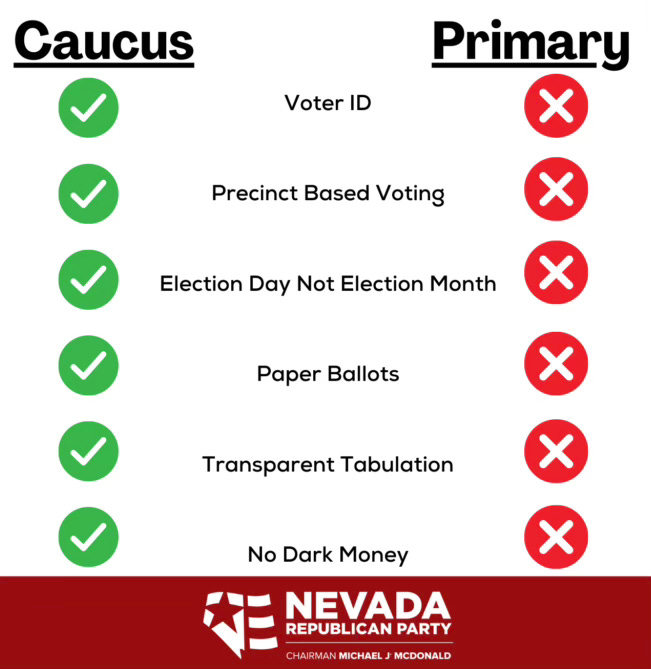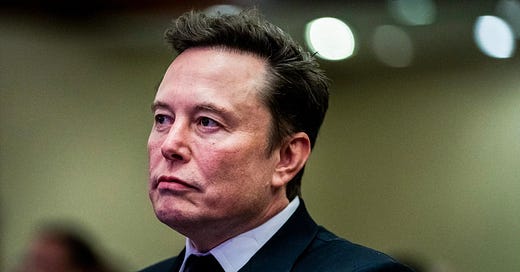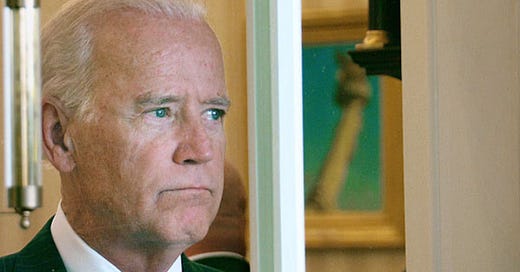
Nevada: The messy nomination contest you're not watching
Why a weird primary/caucus combo could be pivotal
Allow me to spin out a scenario for a second here. Imagine that Donald Trump maintains his dominance in national Republican nomination polls, but Ron DeSantis and Nikki Haley, spurred by some key recent endorsements, make large gains in Iowa and New Hampshire, respectively, over the next month. (This could be happening already — there hasn’t been much polling in those states recently.) And then DeSantis and Haley either defeat Trump in Iowa and New Hampshire or come within 10 points or so of him, massively outperforming expectations. Suddenly, it’s a real contest, with three credible candidates slugging it out and Trump struggling to prove that he’s not a paper tiger resting on a national reputation.
So what happens next? Nevada! Now, astute nomination watchers may recall that Nevada has often jumped back and forth between primaries and caucuses. Which is it this year? Why not both!
Yes, Nevada is doing an especially weird contest this cycle. On Tuesday, February 6th, the state is holding an official presidential primary election. On Thursday, February 8th, the Nevada Republican Party is hosting a presidential caucus. The first could have higher turnout, the second is what you need to actually win any of Nevada’s 26 national convention delegates. Oh, and candidates can only compete in one of those. Josh Putnam has lots of details here.
Why such a system? Basically, a new state law mandates a state-run primary if at least two candidates are vying for a nomination, but Republicans in the state wanted to keep the caucus system and have urged candidates to compete in that instead. The state party is even advertising it:
What’s interesting is that the candidates have approached the contests differently. Donald Trump, Ron DeSantis, Vivek Ramaswamy, Chris Christie, and Doug Burgum have all chosen to compete in the caucuses, for a shot at winning some delegates. (These will be awarded proportionally, not as winner-take-all.) Nikki Haley, meanwhile, chose to compete in the primary, along with a handful of minor candidates and Mike Pence and Tim Scott. The calculation was that a high-profile win in that contest would be worth a lot more than a few dozen delegates. Except, as you may note, Pence and Scott are no longer running. Which means Haley essentially has that primary locked down.
Needless to say, it is really not obvious how that contest will be seen. Nikki Haley will assuredly do very well in the primary, but it’s hard to know what percent she has to get to get much credit for it. The fact that she’s the only major competitor in her race might mean that it gets ignored, which would be ironic considering the only reason to compete in it is for the attention. Beating Pence or Scott would have been good for her campaign; beating nobody probably won’t do much; just barely beating a nobody could be harmful.
What’s going to happen in the caucuses? Who the hell knows? Trump was trouncing DeSantis by about 50 points in the last polls there, but no one’s done a public poll there in two months. And those numbers could move quite a bit if DeSantis and Haley overperform in Iowa and New Hampshire.
A wounded Trump could take a hit in Nevada. Even if he wins narrowly, DeSantis and others will pick up some delegates, and he’ll look more vulnerable for the coming contests. And guess what the next one is: Nikki Haley’s home state of South Carolina. Again, polls there right now have Trump with a large lead, but if he underperforms in the first three contests, those numbers will move.
Anyway, no, I have no idea if any of this will happen. It’s possible Trump will win all of these contests (except the Nevada primary!) in a romp. But if the first two contests do end up being competitive, all eyes will turn to Nevada, and they won’t know what they’re looking at.


















Read “UNBOUND” by Curly Haugland and Sean Parnell available on Amazon
That is true! Their consultants lie to them.
In GOP.com find rules numbered 1-42. In the preamble read the last few words…”and the rules of business of this national convention”. That will be the preamble to the Rules of the Republican Party to be adopted in 2024 at the National Convention.
The Rule 16 you refer to is in the section of rules “the rules under which delegates and alternate delegates shall be allotted to the respective states in the next national convention”. (2028)
Rules 26-42 are the rules that will govern the Republican National Convention in 2024.
Rules 1-25 will apply to time, after the convention, and only UNTIL the next convention; and they only apply now UNTIL the convention. Voting to choose the Republican nominee will take place under yet to be determined rules for the 2024 convention.
The RNC AND THE CONSULTANTS ARE LYING TO THE CANDIDATES! Sad!